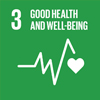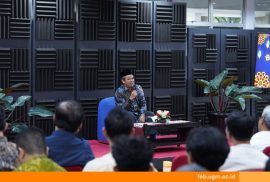
In the dynamic and achievement-driven atmosphere of campus life, one phenomenon often goes unnoticed yet is quietly experienced by many students: the duck syndrome. This term describes a condition in which a person appears calm and composed on the surface but struggles intensely, mentally and emotionally.
Anisa Yuliandri, S.Psi., M.Psi., a Psychologist from the Career and Student Development Unit (CSDU) FEB UGM, explained that the term “duck syndrome” comes from the metaphor of a duck gliding gracefully across the water, while underneath it is paddling frantically to avoid sinking. This phenomenon is increasingly common among students today.
“Students want to appear capable, strong, and highly productive. Unfortunately, behind all that, many feel exhausted and overwhelmed, yet do not always know the right way to deal with it,” she said.
“Duck syndrome” first describes Stanford University students who appeared calm but were under immense pressure. Similar conditions exist on campuses worldwide, including in Indonesia. Students strive to meet high expectations from themselves and their surroundings, maintaining their GPA, being active in organizations, taking internships, joining competitions, and even keeping up appearances on social media.
“Many students feel they must seize every opportunity for fear of being left behind. They are concerned that if they do not participate in everything, people will think they are lazy, uncompetitive, or have no prospects,” Anisa added.
According to the Self-Determination Theory, humans have three basic psychological needs: autonomy, competence, and relatedness. Duck syndrome is closely related to this concept because when external pressure instead of personal desires guides life choices, it can disrupt an individual’s psychological balance.
Additionally, the culture of always appearing “fine” makes students suppress or hide their genuine emotions. Many feel that they cannot seem tired or give up for fear of looking weak. Anisa added that high perfectionism often leads people to conceal their weaknesses and struggles.
“We are human, and we have limits. But in the effort to maintain a perfect image, everything ends up being bottled up inside,” Anisa said.
Anisa also pointed out that social media reinforces this pressure. She gave the example of how one’s social media feed might be filled with other people’s achievements, winning competitions, securing internships, graduating early, or going on vacations, which can lead to feelings of falling behind. To keep up, students often push themselves to appear productive.
“This aligns with the Impression Management Theory, which explains the tendency for individuals to regulate and control their self-image so they appear strong and capable, even when they are deeply exhausted behind the scenes,” Anisa explained.
Duck syndrome can be dangerous because it is invisible. Since individuals appear fine, many do not realize they are experiencing psychological distress. Phrases such as “everyone is tired” or “this is just what it takes to succeed” often justify overexertion.
However, if left unaddressed, Anisa warned, this condition could escalate into more serious mental health issues such as chronic anxiety, insomnia, burnout, and even depression. The internal conflict between feelings and outward expressions creates heavy cognitive dissonance. Over time, individuals may feel disconnected and struggle to distinguish between being busy and happy. The symptoms of duck syndrome can also affect social relationships; students may withdraw, feel inadequate, and avoid interaction.
“They fear being judged or seen as failures. In reality, what they need most is simply space to express themselves,” Anisa said.
Anisa emphasized the importance of students recognizing the signs of duck syndrome and taking small steps to address it. The first step is being honest with oneself. Acknowledging that you are tired is not a weakness but an act of courage.
“It’s okay not to be okay. We don’t always have to be productive or look happy. Allowing yourself to feel sad is part of the healing process,” Anisa said.
The next step is managing expectations, both from oneself and from others. Students should understand that not every standard needs to apply to them, nor do they need to take on every role. Declining a responsibility to protect one’s mental health is valid.
“Learning to say no without guilt is essential,” Anisa added.
She also stressed the importance of speaking up. Sharing your feelings with even just one person can be deeply relieving. FEB, through CSDU, offers free counseling services that are accessible to all students. FEB UGM also runs a peer support program, which consists of trained peers who can provide a safe and supportive listening environment.
“No one is wonderful all the time. We don’t have to pretend to be strong. If all you can do today is hold on, that is enough. Holding on is a form of courage,” Anisa concluded.
Report by: Orie Priscylla Mapeda Lumalan
Editor: Kurnia Ekaptiningrum
Sustainable Development Goals









